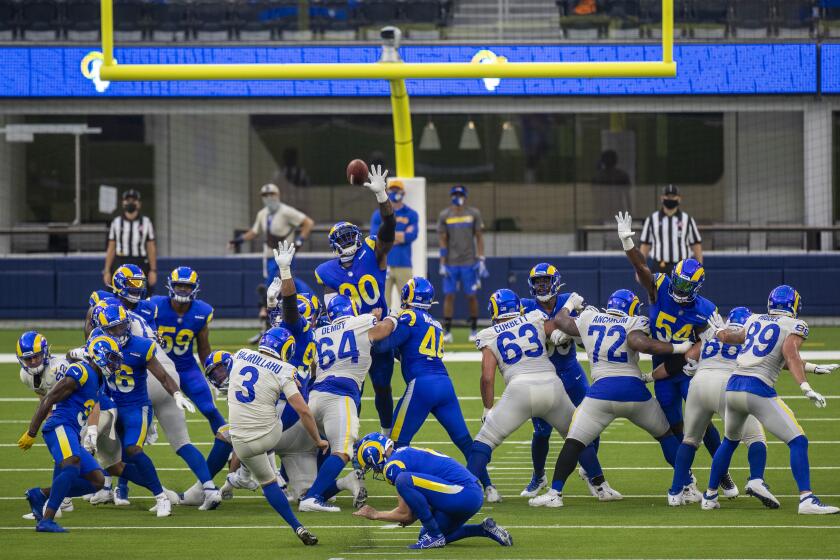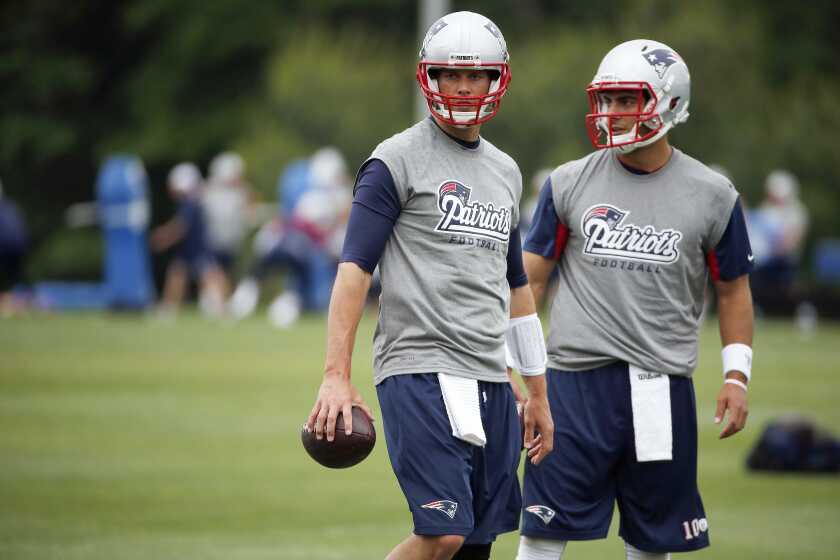Inside the Patrick Mahomes-Mike Trout race to $500 million
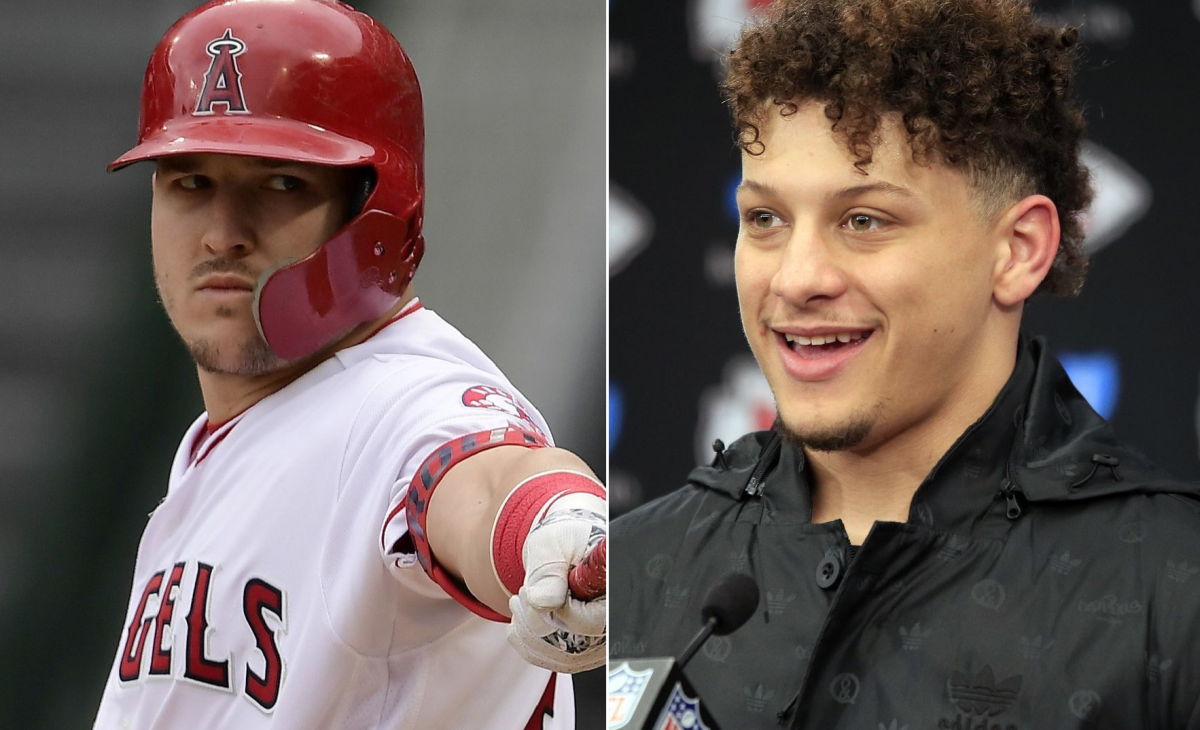
The NFL season starts Thursday, with Patrick Mahomes leading the Kansas City Chiefs as they defend their Super Bowl championship. The new season also marks the official start of an off-the-field race, with Mahomes and the Angels’ Mike Trout competing to become the first athlete in North American team sports history to earn a half-billion dollars in career salary.
On July 6, Mahomes signed a 12-year contract that guaranteed him $141 million, with options and award bonuses that could increase the value of the deal to as much as $503 million.
The agency that represents him, Steinberg Sports and Entertainment, tweeted that Mahomes had become the “first half billion dollar player in sports history” and called the deal the “largest contract in the history of sports.” Those statements might turn out to be true, but no one will know for years.
Just 16 months earlier, and about 16 miles from where founding agent Leigh Steinberg works in Newport Beach, Trout and the Angels had celebrated a record contract in Anaheim.
The Angels had signed Trout to a 12-year contract that guaranteed him $426.5 million: no options, and no award bonuses. That contract today remains the largest in North American team sports history, but Mahomes’ agent said he structured a deal that should eventually generate more money than Trout’s and could transform the template of NFL contracts.
An in-depth look at the Rams, Chargers and the rest of the NFL ahead of the 2020 season.
“We effectively negotiated a fully guaranteed contract in a sport that doesn’t have full guarantees,” said Chris Cabott, the agent for Mahomes and the president of Steinberg Sports and Entertainment.
The maximum value of Mahomes’ bonuses: $25 million, and he gets that much only if he is selected as the NFL most valuable player every year, and the Chiefs make the Super Bowl every year. The New England Patriots made the Super Bowl five times in the past 10 years, and only Peyton Manning has been named NFL MVP more than three times (he won it five times from 2003 to 2014).
Subtract the potential bonuses, and the total is $477 million. If the Angels could guarantee Trout $426.5 million, why couldn’t the Chiefs guarantee Mahomes $477 million?
The reason, Cabott said, is that the NFL — unlike Major League Baseball — requires teams to prefund contract guarantees. The Angels can spread the guaranteed money over the life of the contract, but the Chiefs would have had to put $477 million in escrow had they guaranteed that amount to Mahomes.
“If MLB had that same rule, very few teams would have the cash flow to write a check for 477 [million dollars], in the offseason,” Cabott said.
The NFL instituted the rule, according to league vice president Brian McCarthy, so that “if for some reason a club defaulted on its loans and couldn’t end up paying the guaranteed money, the other 31 clubs would not be liable.”
The NFL is notorious for trumpeting what Cabott called “fake contracts” — long-term deals with minimal guarantees, with a big fat potential value and little chance of the player actually realizing that value.
Quarterback Drew Bledsoe, for instance, signed a contract in 2001 heralded at the time as the richest in NFL history, with a value announced at $103 million. His eventual take from that deal: $22 million, according to NFL salary expert Jason Fitzgerald of overthecap.com.
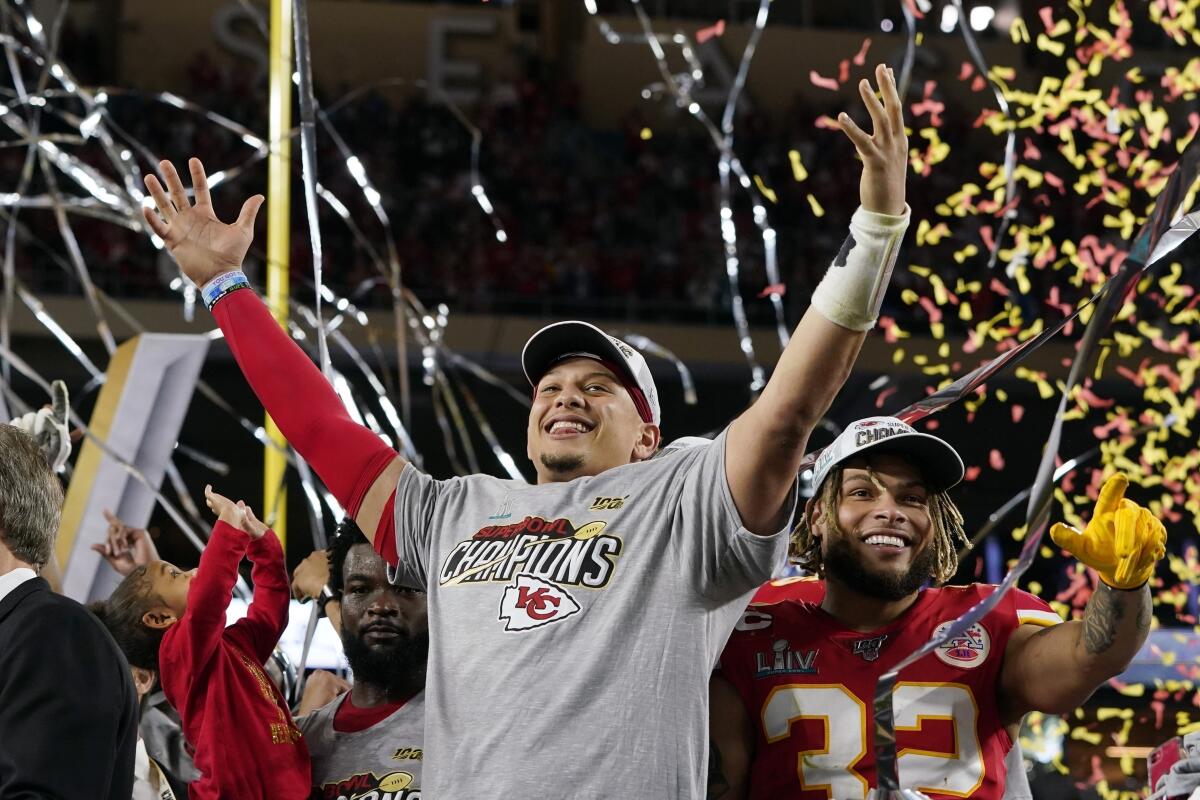
“We didn’t want to be in that situation,” Cabott said. “We wanted to be in the situation where we’d have mechanisms that would give him guarantees.”
In MLB, guarantees give teams a reason to retain players who might otherwise be cut. Since 2016, according to Fangraphs, the Angels’ Albert Pujols has not delivered a performance better than what a readily available minor leaguer might produce. However, his 10-year, $240-million contract is guaranteed, so the Angels have an incentive to play him, since they have to pay him even if they cut him.
Many MLB contracts have option years beyond the guaranteed years. The Dodgers, for example, have the option to extend the contracts of Max Muncy and A.J. Pollock through 2023, but they do not need to decide until after the 2022 season.
For Mahomes, Cabott essentially parlayed option years into what he believes will become guarantees. Over the life of the contract, the Chiefs face annual decisions about whether to exercise Mahomes’ options well in advance — one year ahead in some cases, two years in others. For example, before the 2023 season starts, the Chiefs must decide whether to pay him in 2025.
If Mahomes were to have a poor year in 2023, the Chiefs could consider whether to cut him. But, no matter what team he might try to rebound with in 2024 or 2025, the Chiefs would have to pay him.
And, under NFL rules, Mahomes’ salary still would count under a hard cap. The Dodgers or Angels could cut a star, pay off his guarantee and sign another star. The NFL salary cap almost certainly would not allow the Chiefs to do the same.
“Would you rather cut Patrick Mahomes and still owe him $50 million-plus, or would you rather pay him to stay on the roster?” Cabott said. “You’d rather pay him to stay on the roster.”
If Mahomes’ performance were to suffer a sustained decline, as Pujols’ has done, the Chiefs could cut him, absorb the cap hit, and rebuild. At the same time, Mahomes could sign elsewhere and try to rebuild his career.
However, barring a career-ending injury, Cabott sees little risk for either Mahomes or the Chiefs.
“Patrick’s playmaking abilities and instincts are extremely rare,” Cabott said. “That’s the thing that makes him such an incredible talent. Those are things that don’t wear off.”
The contract extends through the 2031 season, and Mahomes will be 35 when that season starts. For an NFL quarterback, that is not old: In each year since 2013, at least two All-Pro quarterbacks — and as many as four — have been at least 34 years old. (In 2019: Tom Brady, Drew Brees, Philip Rivers and Aaron Rodgers.)
If Mahomes completes his contract, and with it 15 years without a career-ending injury, his financial reward could be sweet indeed.
“He’ll have higher career earnings than LeBron James in 19 years,” Cabott said. “He’ll have higher career earnings than Alex Rodriguez in 23 years.”
In July, the Dodgers signed Mookie Betts for 13 years and $392 million.
“It’s longer than Patrick’s, but it’s actually less than Patrick’s,” Cabott said. “When I saw that, while I was extremely happy for Mookie, because he deserves it, I was happy for pro football. For the first time in history, the most violent sport has been the most rewarded sport in American team sports.”
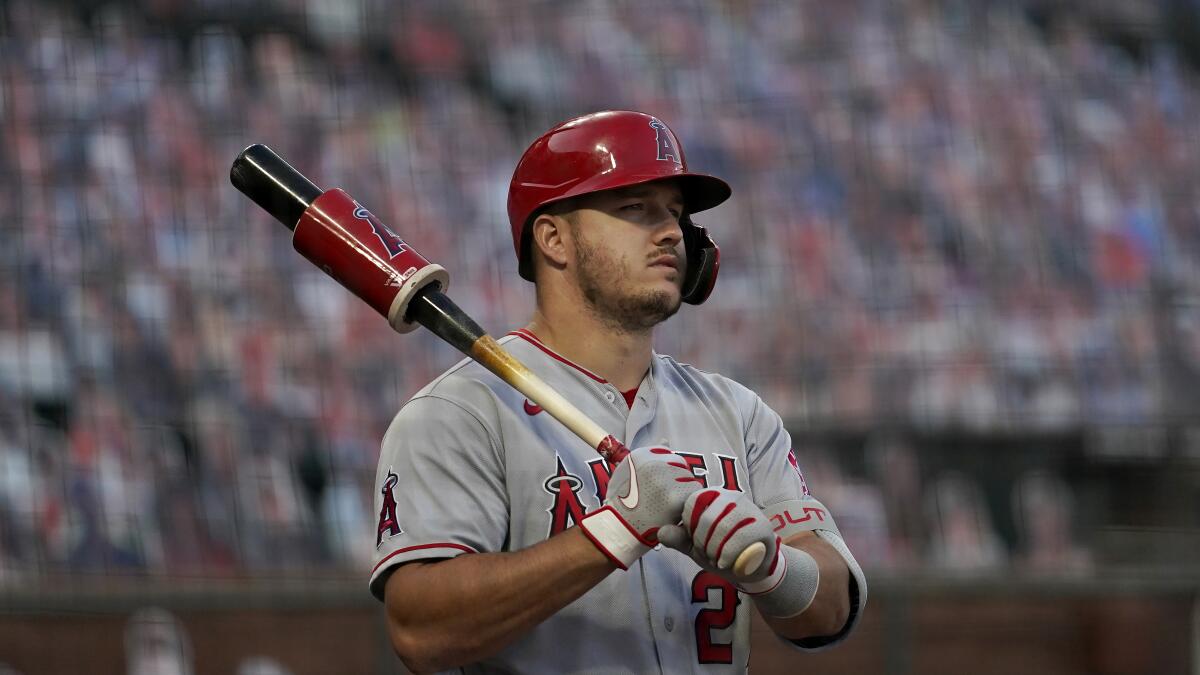
Trout earned $80.2 million before his current contract kicked in. In 2030, when it expires, his total career earnings would have been $506.7 million.
However, because of the abbreviated schedule triggered by the coronavirus pandemic, his 2020 salary was cut from $36 million to $13.3 million, so his assured earnings stand at $484 million.
He still could win the race to $500 million, if he signs yet another deal and plays at 40.
Mahomes could sign another deal, too, for the 2032 season. He would be 36. His agent is convinced Mahomes can play at a high level from now until then, and perhaps beyond, even if hurt.
“Well, we saw him throw a strike left-handed against the Broncos,” Cabott said, laughing. “So, if they cut off his right arm, I’m still pretty confident in his left.”
More to Read
Go beyond the scoreboard
Get the latest on L.A.'s teams in the daily Sports Report newsletter.
You may occasionally receive promotional content from the Los Angeles Times.

